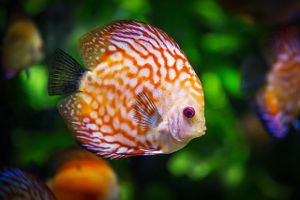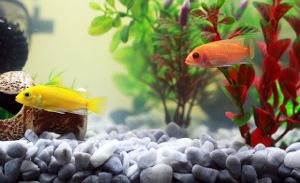Ask a writer about his or her pets and you’ll likely hear
a story of long-term friendship and love.
We spend a lot of our time alone with our computers, so it’s likely that we, perhaps more than others, appreciate the benefits our pets bring into our lives.
They are the ones that sit close by while we type out our bestsellers, soothe our sadness when our work is rejected, and rejoice (or hide under the couch) when we squeal over our successes.
There really is no judging the little creatures in our life, but I read a study the other day that got me thinking: Just what kind of pet is best for a writer?
Below, I explore the various health benefits provided by the different types of animals we may choose to share our lives with. Is one any better than another? I’d love to hear your thoughts!
 Fish: The Low Maintenance, Calming Option
Fish: The Low Maintenance, Calming Option
There are few things as relaxing as watching a group of fish swim around in an aquarium. Just sitting and observing these little gilled and graceful beings is good for you, particularly if you’ve had a stressful day.
Researchers reported in 2015 that people who spent time watching aquariums and fish tanks experienced measurable reductions in heart rate and blood pressure. The more fish in the tank, the more they improved people’s moods. It was the variety they liked—watching the different shapes and colors as the fish moved around.
 If you’re going through a book launch or waiting on a decision from an agent or editor, this may be the type of pet you want!
If you’re going through a book launch or waiting on a decision from an agent or editor, this may be the type of pet you want!
Fish are known to provide a calming, tranquil effect, and their aquarium can be a truly beautiful addition to your home.
Indeed, demand for fish has increased lately, especially among people who live in smaller homes and apartments.
Fish don’t require as much care as other types of animals, nor do they need the same amount of space. They don’t suffer from separation anxiety when you’re gone (at least as far as we know), they get by with minimal cleanup, and they are quiet—no worries about bothering the neighbors with these guys.
 Cat: Good for Your Heart Health
Cat: Good for Your Heart Health
Owning a cat is good for your heart, and that’s just the beginning. In a 2009 study, participants who had the royal pleasure of owning a cat had a lower risk of death from heart attack or stroke than those who didn’t—more specifically, a 30 percent lower risk of suffering from a heart attack.
“Acquisition of cats as domestic pets may represent a novel strategy for reducing the risk of cardiovascular diseases in high-risk individuals,” the researchers wrote.
In fact, cats are so good at helping protect your heart that they were named as “better than cholesterol meds” in a 2008 article in Psychology Today.
Researchers theorize that it’s the action of petting cats that helps reduce stress levels and protect the heart. Cats are notoriously lap animals, and we humans experience a number of health benefits from simply stroking their fur, experiencing their warmth, and listening to them purr.
 The purr may be what gives cats their true healing superpower. A 2006 study by Fauna Communications found that the average cat’s purr has a frequency between 25 and 140 Hz, which covers the same frequency range as that used for therapeutic bone growth, fracture healing, pain relief, wound healing, tendon repair, and muscle and joint repair.
The purr may be what gives cats their true healing superpower. A 2006 study by Fauna Communications found that the average cat’s purr has a frequency between 25 and 140 Hz, which covers the same frequency range as that used for therapeutic bone growth, fracture healing, pain relief, wound healing, tendon repair, and muscle and joint repair.
Indeed, the purr originally developed in the cat as an evolutionary way to heal their own bodies. The sound and vibration may do the same for us on a smaller scale.
A cat does require more time and energy than fish, obviously, and you’ve got to be able to handle the regular litter box cleanup. They are great for small homes and apartments, though, as they can be total inside animals. They’re usually less destructive than dogs when left at home, so if you travel now and then and don’t have a yard—and you don’t mind the occasional cat hair on your keyboard—this may be the best pet for you.
 Guinea Pigs: Great for the “Cuddle” Factor and for Kids
Guinea Pigs: Great for the “Cuddle” Factor and for Kids
Like all pets, guinea pigs provide us with companionship and stress relief, but they have a special quality that was discovered in a 2013 Australian study.
Researchers gave guinea pigs to one group of children with autism spectrum disorder as well as to another control group. They found that children with autism, when playing with the guinea pigs, showed significantly increased positive social behaviors. They also displayed less anxiety. The researchers concluded that the animals acted as “social buffers” for the children, while providing measurable affects on their anxiety and stress levels.
These cuddly little guys are similar to cats in that they chirp and purr, their sounds potentially soothing and healing, and they also provide the “petting” benefit, as they love to be held and loved. And unlike some rodents, guinea pigs are not nocturnal, so they won’t wake you up with their rustling at night.
 They’re also a fairly economical option when considering pet ownership, they work well in small homes, and they’re actually considered to be “clean” animals, preferring their houses to be fresh and tidy.
They’re also a fairly economical option when considering pet ownership, they work well in small homes, and they’re actually considered to be “clean” animals, preferring their houses to be fresh and tidy.
That means you need to clean the cage daily, but you can potty train them to go in a certain area if you take the time. In fact, they’re smart enough you can even teach them tricks if you’re so inclined. (Great activity for those times when you’re trying to figure out your next chapter.)
Guinea pigs are quiet and friendly, but they do need your attention, so don’t plan on leaving them for days at a time without someone checking in. If you do have to be gone for long hours at work, you may want to consider getting two, so they can keep each other company.
If you’re a writer who wants a cuddler but isn’t into cats, this may be a good option for you. Guinea pigs also work great as first pets, as they help teach children how to care for a little creature. If you have someone in the family with autism or a similar disorder, this little guy may be just what you need to open up the lines of communication.
 Horse: The Best Option to Get You Outdoors and Feeling Confident
Horse: The Best Option to Get You Outdoors and Feeling Confident
The number of health benefits associated with owning a horse are so numerous it would take a whole other post to list them all. Horses not only help relieve stress, they get you outside and get you active, providing a really enjoyable mode of exercise.
You work all your muscles while riding, and then there’s the grooming, mucking out the stalls, throwing hay, hauling water, and more that builds up muscle strength and aerobic capacity. Studies have shown that these activities can be qualified as “high-intensity,” so if you’re tired of the beach body workout but you want to lose a few pounds, this is the pet for you.
One of the really unique benefits of horse ownership is that when you ride, you stimulate and ease digestion. The horse’s gait is so similar to a human’s that your internal organs react as they would when you take a walk, which means a quick ride after dinner is a great idea. A ride also aids in liver function, burns calories, and is a super form of exercise for those in wheelchairs.
 In a 2012 study, researchers reported that horseback riding was particularly beneficial for women riders, encouraging physical activity and stimulating self-confidence. Women, in particular, also seemed to enjoy the psychological interaction with the horse, and experienced benefits in mental and emotional well being from being around them.
In a 2012 study, researchers reported that horseback riding was particularly beneficial for women riders, encouraging physical activity and stimulating self-confidence. Women, in particular, also seemed to enjoy the psychological interaction with the horse, and experienced benefits in mental and emotional well being from being around them.
Horses may boost your brainpower, too. Stalling on a writing project? Go take a ride. According to a 2017 study, horseback riding improved memory, learning, and problem solving. Apparently the vibrations produced by the horse’s movements activated the sympathetic nervous system, which resulted in improved performance on cognitive tests.
As Sir Winston Churchill said, “There is something about the outside of a horse that is good for the inside of a man.” Yes, they’re more expensive, they take more time, and they can be high-maintenance, but those of us who love them know it’s all so worth it.
If you want the perfect animal to get you away from your computer, into the great outdoors, and moving in a way that eases your digestion and your nerves while stimulating your brain’s ability to solve that plot problem, a horse is your best bet.
 Bird: The Pet That Talks Back and Lives Long
Bird: The Pet That Talks Back and Lives Long
My uncle owned a pet parakeet for many years. I have a picture of him with the little guy on his shoulder. He would talk away to it and it would sit there as if listening to his every word.
Birds are intelligent creatures. The National Audobon Society says that birds have problem-solving abilities and cognitive capabilities that demonstrate high intelligence. You can teach most to do tricks, and some to talk. That requires interaction, which helps relieve stress and stimulate your brain. Give them some toys and they’re also really entertaining to watch.
Birds may not be as naturally loving as some of their furry counterparts, but with regular interaction they can become very affectionate. Some even accompany their owners on regular daily errands, so if you want some company when getting more paper or ink, look into pets of the beaked variety.
Birds are also longer-lived than most other pets, which can save you the frequent grief that comes with losing critters like guinea pigs, cats, dogs, and fish, which usually don’t live nearly as long. They’re fairly economical to keep, particularly if you save some of your fruits and vegetables for them. (They might even encourage you to eat healthier along the way?)
 Birds usually work well for those living in apartments and condos, though they can be noisy if they don’t get enough attention, so keep that in mind.
Birds usually work well for those living in apartments and condos, though they can be noisy if they don’t get enough attention, so keep that in mind.
Birds can also be messy. Most experts recommend you let the bird out of its cage for several hours a day, and that can mean cleaning up after it wherever it happens to go.
Rarely is their mess confined to their cage even when you leave them in it, as they tend to peck and flick their food and bedding materials about. You’re likely to find little pieces of it on the floor, in the corners, and perhaps even on any nearby furniture. If you’re opposed to regular clean-up, don’t get a bird.
If, however, you work full-time at home and you like the idea of a long-lived, intelligent pet that’s amusing to watch, a bird may be the way to go.
 Dog: The King of Companion Animals
Dog: The King of Companion Animals
Okay, I saved the king of pets for last. Indeed, the dog has the most scientific research behind it as far as what it can do for humans, and the benefit list is long. They do most everything all the other pets listed here do, and more.
Yes, they relieve stress, promote exercise and activity, and provide the “petting” and loving factor. They’re smart and can learn all sorts of tricks from you, stimulating your brain and theirs at the same time. They’re great for kids with developmental disorders and disabilities, as well as for adults who need extra help, such as those who are epileptic, blind, or paralyzed.
Dogs are regularly used as therapy animals, as they can help people heal faster from surgery and illness, while lowering stress levels in caregivers. They’ve even been found to ease pain in people who suffer from fibromyalgia and joint problems. In a 2014 study, participants who received animal-assisted therapy after going through joint replacement surgery needed 28 percent less pain medication than those who didn’t get this type of therapy.
Studies have shown that dogs, like cats, help reduce heart disease, and that dog owners are way more likely than those without dogs to stick with their 30 minutes of daily exercise. Because of a dog’s demand for that regular walk, it can help you lose weight and work out your plot problem, because as mentioned in our previous post, walking is great for writers.
Scientists have found that social ties are important to our long-term health and wellbeing. Dogs help here, too. Dog owners make new friends more easily, because people are more likely to talk to someone when they have a dog with them.
 People find it common to interact more often with their neighbors and others in the community when they go out with their dogs. In a 2015 study, researchers found that pet owners were 60 percent more likely than non-pet owners to get to know people in their neighborhoods they hadn’t known before.
People find it common to interact more often with their neighbors and others in the community when they go out with their dogs. In a 2015 study, researchers found that pet owners were 60 percent more likely than non-pet owners to get to know people in their neighborhoods they hadn’t known before.
Many writers are prone to depression, which makes a dog the perfect companion. A 2004 study reported that the hormonal changes that occur when humans interact with dogs help people cope with depression. Just a few minutes with a dog releases feel-good hormones in humans, including serotonin, prolactin, and oxytocin. It also reduces the stress hormone cortisol.
Dogs may even improve your relationship with your partner or spouse, as shown in a 1998 study. Researchers reported that couples who owned dogs (or cats) responded better to stress, had closer relationships, and were more satisfied with their marriages than couples who did not own these pets.
There are some drawbacks to owning a dog. If you have to be gone for any length of time at all, you’ll need to find a pet sitter or kennel. They need daily exercise, and require either a back yard or a daily walk, preferably both. Some smaller dogs will do okay in an apartment as long as you get them out every day. They tend to need more attention than most pets, require at least a basic level of obedience training, and can be destructive when you’re gone.
There are few animals that provide as much interaction, stress relief, and understanding as a dog, though, as any writer who owns one will tell you.
 Any Pet Will Benefit a Writer
Any Pet Will Benefit a Writer
It’s fun looking at the pros and cons of different types of pets—and obviously I can’t cover them all—but the bottom line is that any pet is better than none. There’s something about caring for another living thing that brings out the best in us.
According to a recent research on animals and human health, all pets, including rabbits, fish, and even crickets, are good for us. In a 2016 study, one group of elderly participants received five crickets in a cage with detailed instructions on how to take care of them. The other control group received only health advice. Eight weeks later, those who were caring for the insects scored lower on the depression scale and showed improvements in mental health.
“Caring for insects,” the researchers stated, “which is cost-effective and safe, was associated with a small to medium positive effect on depression and cognitive function in community-dwelling elderly people.”
Even the Centers for Disease Control and Prevention (CDC) states that pets decrease blood pressure, triglyceride levels, and cholesterol levels; reduce feelings of loneliness, encourage physical activity, and provide opportunities for social interaction. It’s fun to debate which critter is best, but at the end of the day, what matters is having something around that you care about, and that needs you.
As Emily Temple says in her article, “Adorable Pictures of Famous Writers and Their Pets:”
“To us, it’s always seemed as though pets attach themselves to artists (and vice versa, of course) in greater numbers than to regular folks — or at least that almost every artist we know needs a furry friend to talk to.”
What is your favorite kind of pet?
Sources
American Medical Association. (2006, November 29). Statins Reduce Risk Of Heart Attack And Stroke In Those Without Heart Disease – Medical News Today. Retrieved from http://www.medicalnewstoday.com/releases/57687.php
Baker, L. (1998, March 12). Pet-Owning Couples Are Closer, Interact More Than Pet-Less Couples, UB Study Shows – University at Buffalo. Retrieved from http://www.buffalo.edu/news/releases/1998/03/3479.html
Beckoff, M. (2017, April 10). Rabbits, Fish, and Even Crickets Are Good for Mental Health. Psychology Today. Retrieved from https://www.psychologytoday.com/blog/animal-emotions/201704/rabbits-fish-and-even-crickets-are-good-mental-health
The Cat’s Purr – A Biomechanical Healing Mechanism? (2009, September 14). Retrieved from http://consciouscat.net/2009/09/14/the-cats-purr-a-biomechanical-healing-mechanism/
CDC. (2014, April 30). Health Benefits of Pets | Healthy Pets Healthy People | CDC. Retrieved from https://www.cdc.gov/healthypets/health-benefits/
Havey, J., Vlasses, F. R., Vlasses, P. H., Ludwig-Beymer, P., & Hackbarth, D. (2014). The Effect of Animal-Assisted Therapy on Pain Medication Use After Joint Replacement. Anthrozoos: A Multidisciplinary Journal of The Interactions of People & Animals, 27(3), 361-369. Retrieved from http://www.tandfonline.com/doi/abs/10.2752/175303714X13903827487962
Healthy Pets. (2011, March 3). Ten Reasons Why It’s Good to Get Fish as Pets. Retrieved from http://healthypets.mercola.com/sites/healthypets/archive/2011/03/03/ten-reasons-why-fish-make-good-pets.aspx
Hoffman, J. (2015, June 29). Guinea Pigs Are Autistic Child’s Best Friend. New York Times. Retrieved from https://well.blogs.nytimes.com/2015/06/29/guinea-pigs-are-autistic-childs-best-friend/?hpw&rref=health&action=click&pgtype=Homepage&module=well-region®ion=bottom-well&WT.nav=bottom-well&_r=0
Ko HJ, K., Youn, C. H., Kim, S. H., & Kim, S. Y. (2016). Effect of Pet Insects on the Psychological Health of Community-Dwelling Elderly People: A Single-Blinded, Randomized, Controlled Trial. Gerontology, 62(2), 200-9. Retrieved from https://www.ncbi.nlm.nih.gov/pubmed/26383099
Ohtani, N., Kitagawa, K., Mikami, K., Kitawaki, K., Akiyama, J., Fuchikami, M., … Ohta, M. (2017). Horseback Riding Improves the Ability to Cause the Appropriate Action (Go Reaction) and the Appropriate Self-control (No-Go Reaction) in Children. Frontiers in Public Health, 5. Retrieved from http://journal.frontiersin.org/article/10.3389/fpubh.2017.00008/full
Paddock, C. (2008, February 25). Cat Owners Have Lower Heart Attack Risk, Study – Medical News Today. Retrieved from http://www.medicalnewstoday.com/articles/98432.php
Qureshi, A. I., Memon, M. Z., Vazquez, G., & Suri, M. F. (2009). Cat ownership and the Risk of Fatal Cardiovascular Diseases. Results from the Second National Health and Nutrition Examination Study Mortality Follow-up Study. J Vasc Interv Neurol, 2(1), 132-135. Retrieved from https://www.ncbi.nlm.nih.gov/pmc/articles/PMC3317329/
Sturt, K. (n.d.). The 10 Health Benefits Of Dogs (And One Health Risk) | The Huffington Post. Retrieved from http://www.huffingtonpost.com/entry/the-10-health-benefits-of-dogs-and-one-health-risk_us_57dad1b8e4b04a1497b2f5a0
Teitelbaum, J. (2008, August 6). Cats Better Than Cholesterol Meds in Preventing Heart Disease! Psychology Today. Retrieved from https://www.psychologytoday.com/blog/complementary-medicine/200808/cats-better-cholesterol-meds-in-preventing-heart-disease
Weaver, J. (2004, April 8). Puppy love — it’s better than you think – Health – Pet health | NBC News. Retrieved from http://www.nbcnews.com/id/4625213/ns/health-pet_health/t/puppy-love—-its-better-you-think/#.WP7R_R3_oy4
Winter, S. (2015, July 30). Experts say aquariums can boost your health and relax you | Nature | News | Express.co.uk. Retrieved from http://www.express.co.uk/news/nature/594653/Fish-aquarium-boosts-health-relaxing-effect
Wood, L., Martin, K., Christian, H., Nathan, A., Lauritsen, C., Houghton, S., … McCune, S. (2015). The Pet Factor – Companion Animals as a Conduit for Getting to Know People, Friendship Formation and Social Support. PLOS ONE, 10(4), e0122085. Retrieved from http://journals.plos.org/plosone/article?id=10.1371/journal.pone.0122085


We have a cat and a dog, which gives us a bonus–the very entertaining interactions between the two animals. In addition to all the comfort, exercise, and therapy they provide, they make us laugh. And we all know laughter is the best medicine of all.
So true, Pat! What a great comment. Now you have me wondering how they interact, cats and dogs having their history and all!
LOL! There’s a lot of nose touching, chasing each other (both of them invite chasing when they’re feeling frisky), and serious concern when the other pet is doing something out of the ordinary. When Sassy barks because a stranger in coming in the gate, the cat runs to look out the window. And when the cat goes through one of her occasional hairball hacking attacks, Sassy runs over to see what’s wrong. They often share the same sun spot a few inches apart too. One evening I had the dog in my lap and the cat on my shoulder…when I was trying my best to crochet. They’re a couple of clowns.
Awww, sounds like they’re great friends. Ha ha. Love the hairball hacking attack! Hopefully they are close in age so they can stay together for awhile. :O)
I’m in for any and all pets, but of course, the canine IS the king of all companions for me. Lol. I have 9 Labradors in my home, and can’t imagine life without them! And of course as well, they’re all hanging around my desk as I write this 🙂
Ha ha ha. Would love to see that, Susan!
I could never not have pets, though I will admit to enjoying more peace and quiet since my sixteen-year-old Siamese mix passed away over a year ago. He was pretty demanding 😉 I’ve actually cleared out a space in my office for an aquarium and have started to keep my eye out for a good used one. People often start them and don’t realize they do indeed require some decent upkeep to stay looking good.
Ha ha. I know what you mean, Jeri. I had a cat before my current one who was a Siamese cross. They sure know how to use their voices. :O) The aquarium sounds exciting. Would love to see a picture once you have it.
Absolutely LOVED this article. Have enjoyed animals all my life and it’s so neat to read how beneficial they are to your health. Thank you for this.
Thanks, Frances! Lucky you enjoying all those critters! :O)